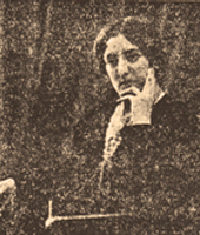
1879-1965
Barbare Kipiani, a granddaughter of Georgian public figure Dimitri Kipiani, was the first woman psycho-physiologist who worked in Europe. Her scientific papers on issues of children’s physiology and pathology were awarded golden prizes.
In 1899, Barbare Kipiani graduated from St. Nino’s educational institution and in 1901 started studying at the medical faculty of the Brussels University. She delivered lectures on Georgian and Russian languages at the Brussels University. From 1908, she was a scientific secretary of the Brussels University’s magazine, Revue Psycholigue.
Upon the initiative of Barbare Kipiani, in 1910, a Georgian department was established in the international museum of Brussels.
Barbare Kipiani was actively engaged in public activities. Her contribution to the protection and promotion of exhibits of Georgian culture is exceptional. She was a guardian of family property and archive of Salome Dadiani and Achille Murat, which she handed over to a Georgian Catholic monk, Michael Tarkhnishvili, who worked in Italy.
Barbare Kipiani’s return to homeland proved to be short because after the Sovietization of Georgian in 1921, she was forced to leave the country again.
Barbare Kipiani’s Address to Georgian Society Regarding the Establishment of Georgian Department in International Museum of Brussels
Brussels, 1910
“The world congress of international associations held in Brussels on 9, 10 and 11 May 1910, took a decision to establish such a museum which will display results of mental and technical achievements of various nations in the sphere of international relations.
“Each country and nation, including Georgians, is allocated a separate hall. This is for the first time ever that Georgia is provided an opportunity to introduce results of its mental and technical achievements to Europe and thus prove that it also has its own life.
“Those special conditions in which Georgia lives now, result from the fact that the country failed to show itself in the international life. In this regard, the Georgian department, compared to other departments of the museum, will be of somewhat distinguished nature.
“There is no doubt that the Georgian department will be a museum within the international museum, because it will facilitate Europe to acquaint itself with Georgia. But in order to have this department established, the compassion from Georgian people is required too.

